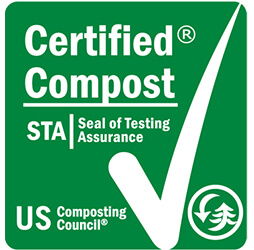
WHAT IS COMPOST?
Compost is organic material that decomposes into a rich soil amendment.
Compost may look like dirt, but it’s so much more than that. Compost is an eco-friendly, cheap, and effective option for fertilizing your garden, plants, and crops.
Many nearby communities, grocery stores, restaurants, and school districts sustainably dispose of their organic waste at the SMSC Organics Recycling Facility. We take what may have been tossed in a landfill and repurpose it into high-quality compost, compost blends, mulch, and other useful products for landscaping projects big and small.

BENEFITS OF COMPOST
- Used as an excellent soil amendment for plants, adding nutrients to the soil
- Adds organic matter back into depleted soils
- Creates a better plant root environment by improving:
- Soil structure
- Porosity
- Density
- Increases infiltration and permeability of heavy soils, reducing erosion and runoff
- Provides habitat for beneficial soil microorganisms
- Diverts material from being landfilled
HOW IT WORKS
OUR PROCESS
Once material arrives at our facility, it is ground up and mixed according to our “compost recipe.” Material is then placed into long composting windrows where it resides for the active composting period (about three months).
Composting is a biological process. Microorganisms break down organics into a soil-like material called compost. This process occurs in nature, but the SMSC Organics Recycling Facility is able to speed up the process to achieve faster decomposition.
SMSC Organics Recycling Facility staff carefully monitor composting windrows for temperature, oxygen, and moisture content to guide management decisions. We operate a windrow turner, which regularly turns the windrows to improve the process. During active composting, microorganisms produce heat, which destroys any pathogens or weed seeds in the compost, and ensures our end product is safe for use.
QUALITY STANDARDS

Our facility is also on the MnDOT Approved/Qualified Products list to supply MnDOT Grade 2 compost.
ADDITIONAL INFORMATION
- To learn more about using compost, visit compostingcouncil.org/compost-use-instructions
- For BPI Certification, visit bpiworld.org
Organics Turning
Windrow composting is a large-scale system where biodegradable waste is shredded, mixed, and placed in rows (i.e., windrows) for composting into a high-quality soil amendment. The organic matter in these windrows is turned to improve porosity and oxygen content, mix in or remove moisture, and redistribute cooler and hotter portions of the pile.
Windrow Turning Facts
- The SMSC Organics Recycling Facility turns windrows once per week, Monday–Thursday, between the hours of 8am–4pm.
- In rare cases, the windrows may be turned on a Friday if weather conditions or other factors prevent turning from taking place earlier in the week.
- Windrows are never turned on weekends.
- Windrows are turned year-round.
- Turning schedules are subject to change.
- The SMSC Organics Recycling Facility turns on days with favorable weather conditions in order to mitigate odors and dust. These conditions include, but are not limited to:
- Wind speeds lower than sustained 15 mph
- Wind directions not affecting residential areas
- Days with temperatures and dew points more than 10 degrees apart, which allows for better odor dispersion.
- Days with lower humidity/dew points
Yard Waste Brick Turning Facts
- Excess fall leaves and brush are stored in a large pile that we let passively compost over 8-12 months
- This brick occasionally needs to be turned to compost properly
- Bricks will be turned a few times a year, during our business hours
MnDOT Specifications
- Grade 2 compost
- The SMSC Organics Recycling Facility is on the MnDOT Approved/Qualified Products List for compost.
- 2A – Common topsoil borrow
- 2B – Loam topsoil borrow
- 2E – Rooting topsoil
- 2F – Boulevard topsoil
- 2G – Filter topsoil
- 2H – Organic topsoil
- B.2 select granular material
- E – Type 5 (storm slash)
- F – Type 6
